The United Kingdom’s 100,000 Genomes Project has reached a major milestone by sequencing 50,000 genomes.
Of the 50,000 genomes sequenced so far, 8,000 are for cancer patients and 42,000 are for rare diseases. Brain, breast, colorectal, lung, prostate, and renal cancers are among the cancers successfully sequenced.
The 100,000 Genomes Project is currently the largest national sequencing project of its kind.
“This important milestone in our partnership with Genomics England marks a significant step towardsdelivering whole-genome sequencing at scale into the National Health Service, and provides physicians with the data to make diagnoses based on a patient’s genome that will lead to better health outcomes,” says Francis deSouza, president and CEO of Illumina, San Diego.
The 100,000 Genomes Project was established in 2012 by then-UK Prime Minister David Cameron. Key to the genome sequencing effort is the public-private partnership formed between Illumina and Genomics England, the entity created by the UK Department of Health to run the country’s project.
“The 100,000 Genomes Project was a stunningly ambitious project when announced by the (then) Department of Health 5 years ago,” says Sir John Chisholm, executive chairman of Genomics England. “Since then, Genomics England and NHS England, now joined by Scotland, Northern Ireland, and Wales, working with a huge number of groundbreaking partnerships, have built the infrastructure and protocols to deliver health-enhancing diagnostics from consented patients with undiagnosed rare genetic disease and common cancers, while at the same time enabling their data, in deidentified form, to provide the basis for research leading to improved therapies and treatments. Having built the platform and reached the 50,000 halfway point, we are now able to operate at a scale to complete the target by the end of 2018.”
Whole-genome sequencing gives a more complete picture of the precise genetic changes causing an individual’s cancer, offering a greater range of treatment options. By providing better insight into the cause of diseases and how diseases develop in each individual, the aim is to ensure medicine is more targeted and unwanted side effects are minimized.
Currently, the average rare disease patient in the UK consults five doctors, receives three misdiagnoses, and waits 4 years before receiving his or her final diagnosis.






